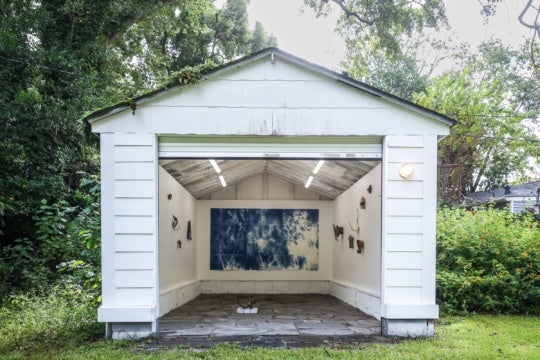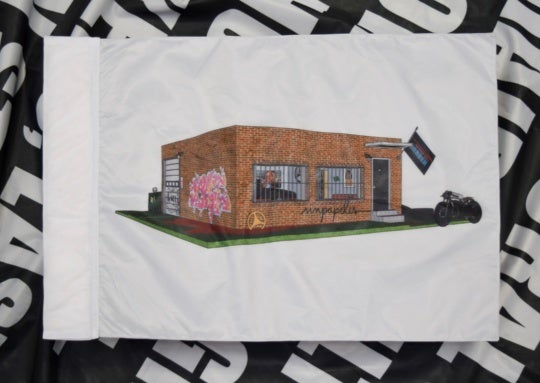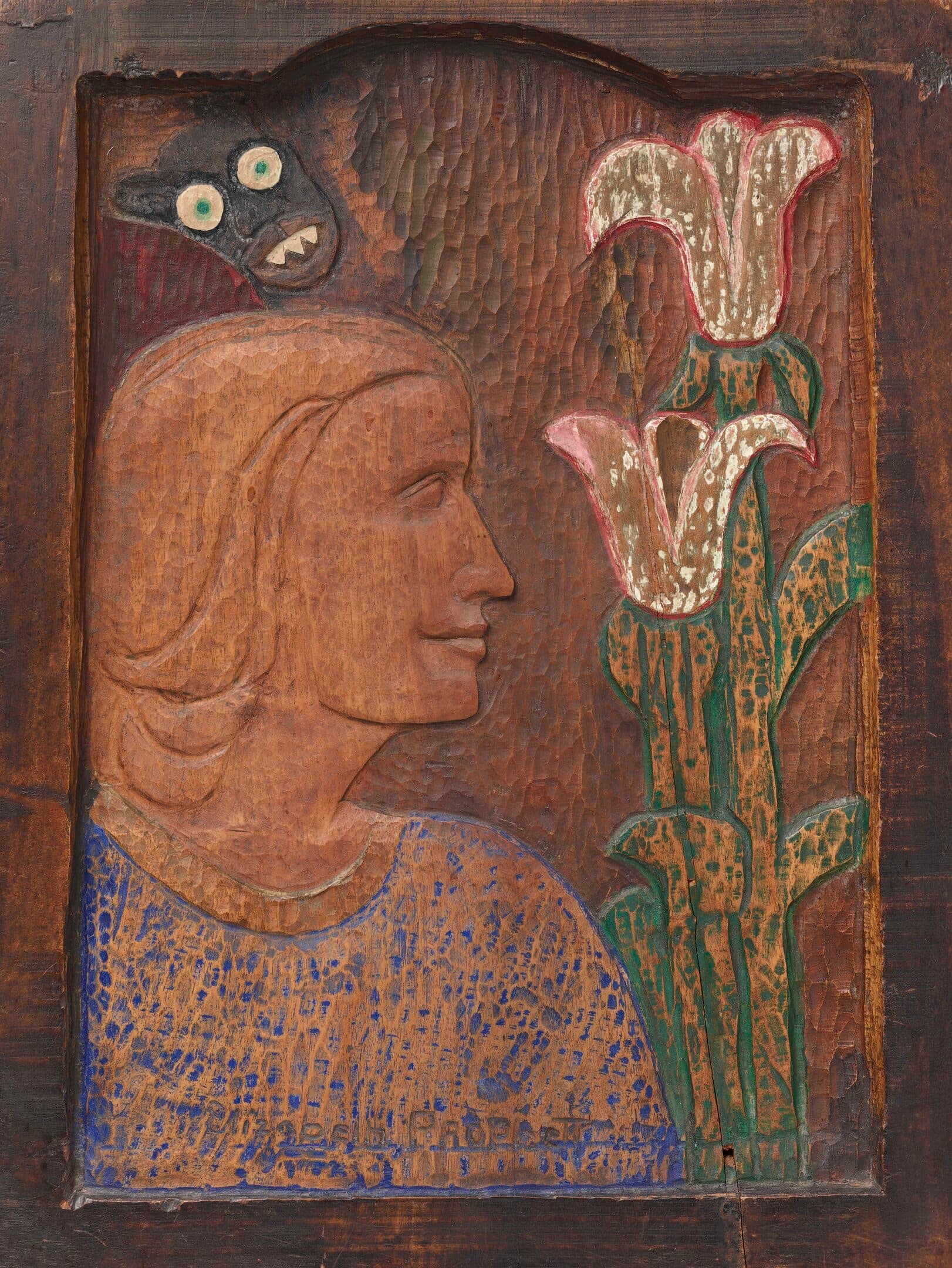
Kirstin Mitchell is an Atlanta-based artist working in many mediums, but with a strong background in performance art. Previously known as Kiki Blood, Mitchell has recently started to distance herself from her more rock ‘n’ roll artist persona. It’s been about five years since she formally performed in Atlanta. In that time, she has produced work primarily in New York City and Italy. On Thursday, March 17, from 6 to 9pm, Atlanta audiences will again have the opportunity to attend one of her performances when she presents Tropic of Gemini at the Atlanta Contemporary, a project commissioned by Dashboard.
Tell me about Tropic of Gemini and its origins.
I’m working on a larger piece with Dashboard and it centers around a boat, and there’s a lot of visions coming up for me of water and seeking, and how to get to that final place. There are, for a number of reasons, these hesitations that are coming up that keep things from falling into place with that specific project, so I needed to do an interim project that reflects these ideas. I needed to reflect that into the world
How will this piece at the Contemporary help you with that?
I’m in a courtship with Courtney Hammond and Beth Malone from Dashboard, so in some way it really is refining how we work on projects together, the way that we move through projects. They’re learning about my process and I’m learning how to work with them in creating these projects.
What can viewers expect to see at Tropic of Gemini?
A walk through paradise.
Describe that. How does that play out?
I’m not going to describe it because that’s giving away the punch line, and that’s a big component of the work that I do. I’ve been asked that question, and so that’s sort of been the narrowed-down answer
Do you want your viewers to find paradise through your work?
I don’t think you can find paradise.
So what do you hope viewers will find through your work?
I can’t spell that out. The piece isn’t finished. The piece isn’t finished until it’s finished. That’s the kind of question, for me, that I feel like will be answered the day after. I can’t ever give a complete overview, especially when it comes to performance, because it’s so experiential. I mean, I know the feeling that I want to convey. It’s all based on feeling, creating, materializing, a feeling.
Tell me about the name Tropic of Gemini. How did you come up with that?
I thought it was actually really corny and I couldn’t find anything better. I just sort of latched onto it. I like that it comes across as a narrative. I like that it’s kind of summery and light-hearted but it’s geographical. It’s timeless. It’s old science. It’s navigation.

Will this work have an endurance aspect to it?
I’m certainly not using that word because this isn’t a race or competition. It’s not like a time goal. The duration needs to be as long as it is to get people to lose interest, to not have people stick around for that long. It’s not that I don’t want them to. It’s more that I’m pulling that out of the mix, because this is not about — I don’t want people to come in and expect a beginning and an end. Or, they come and expect a beginning and an end, and it just doesn’t happen.
What’s it like doing performance art in Atlanta versus New York?
Things were actually happening, unfolding, rather quickly in New York. I thought that was kind of interesting. But Atlanta’s home for me. I have the room, the energetic room to contemplate.
I should clarify one thing that I’ve been thinking on. Kiki Blood was based on a narrative — energetic narrative, emotional narrative, whatever. But it had a beginning, and it had an end. And this new work is based on Contemplative Practice. It’s tricky, because I have to go through it. I have to be in it. It’s a center, it’s a presence.
Tell me about the death of Kiki Blood. What happened?
My ego died. Who I thought I was died. I couldn’t do rock ’n’ roll anymore. I feel like I broke a lot of hearts, actually, when I stopped. I started meditating, and I just completely stopped going out. I stopped partying with people, and hundreds of people just stopped seeing me. I fundamentally believe in re-dos. I think that’s such a huge part of being a human being. Just really letting go of stuff and allowing yourself to learn it, learn again, from a different perspective. So, this stuff needs to be sort of a slow entry and that’s why we couldn’t just go into this death of Kiki Blood. That’s what Beth and I got so excited about. Let’s kill her, let’s throw her off a boat, or do something Kiki Blood-style. But that Kiki Blood style wasn’t in my body anymore. It just wasn’t that crazy. That narrative wasn’t there.
Tell me about working with Dashboard.
It’s been a great experience, because I’m able to use this time to explore different mediums again. I’m a studio artist, but there’s still such an eyeball on me for performance. So I’ve been using that vehicle as a way to explore all these different components, these things that I’m curious about, these things that come up. They’re giving me the room to do that, and I feel like we’re all going through this process together.
What would you like to see happen in the Atlanta performance art community?
There’s a major lack of funding in general in Atlanta for things that are unfamiliar or just out reach. What I would like to see are things that are outside of the box, and not just performance art. I feel like there needs to be investment, because everything has to be done underground. Nothing’s housed under one, clear resource. Which is one of the reasons I like Dashboard. They have such an array of possibilities, and you can typically expect something of a certain caliber, and I respect that. There needs to be more of it.
What’s next for you?
The boat. I’m looking for a boat, and a boatman, for this project.
Do you have a water source for this boat?
Water is still plentiful at this point.
Matthew Terrell writes, photographs, and creates videos in the fine city of Atlanta. His work can be found regularly on the Huffington Post, where he covers such subjects as the queer history of the South, drag culture, and gay men’s health issues. He was a participant in Cycle 2 of BURNAWAY’s Art Writers Mentorship Program.




